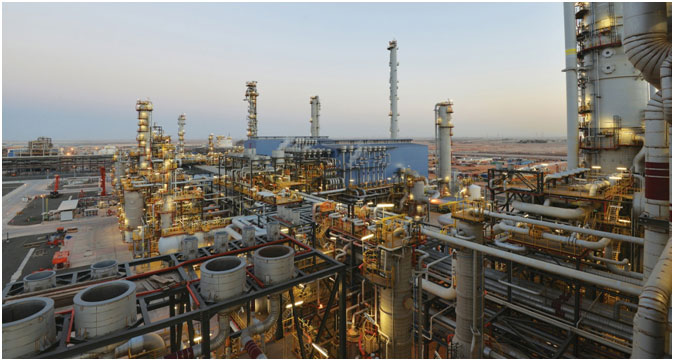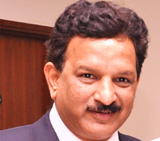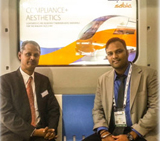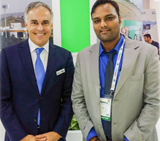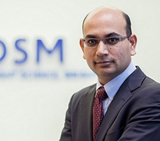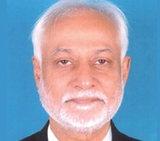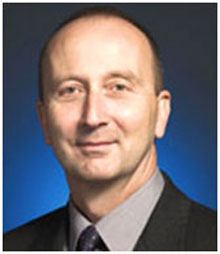LG: How is the Borouge 3 expansion project shaping up?
|
|
LJ: Identical to the Borouge 2 ethane cracker, the Borouge 3 cracker has a capacity of 1.5 million MT/year and is the largest ethane cracker in the world. The cracker commenced operations and started producing on-spec ethylene in April 2014, prompting us to reduce the output from our existing crackers. Towards the end of 2014 we started the commissioning of Borouge 3 polymer plants with the startup of PE-4, which is a 540,000 MT/year Borstar® polyethylene plant. Soon after PE-4 started running stable, PE-5—another 540,000 MT/year Borstar® polyethylene plant—was started up. Production from PE-5 started in January 2015 and the plant is currently running stable. PE-4 and PE-5 together produce about 3,000 MT/day of film products. PP-3, a 480,000 MT/year polypropylene plant for block copolymers equipped with our proprietary Borstar® Nucleation Technology or BNT, was also started up and is currently running stable. LD-1, our low-density polyethylene (LDPE) plant is also being started up. The 350,000 MT/year plant incorporates unique technology from Borealis for high-value wire and cable applications. The plant will initially produce 100% film material for 5–6 months before gradually switching to producing material for wire and cable applications. In April-May 2015, PP-4, the final reactor plant of Borouge 3 will start up. The 480,000 MT/year plant will produce homopolymer and random copolymer polypropylene for film and fibre applications. At this point somewhere in mid-2015, with the exception of a compounding plant for wires and cables, all of the main plants of the Borouge 3 expansion project will be up and running. |
|
|
LG: Is Borouge considering manufacturing outside of the UAE?
|
LJ: Borouge has the world's largest ethane crackers and they are situated close to the feedstock source.
This helps in the cost optimization of not only the crackers but also of the polymer production plants and essentially of the entire Borouge facility. For running a manufacturing facility of this kind outside of the UAE, the feedstock would need to be imported, which is not the way we want to do business. It is much cheaper to send finished polymers to the world than to send gases and liquid chemicals. Borouge however does have an 80,000 MT/year polypropylene compounding plant in Shanghai, China, and we have plans to expand that plant to 140,000 MT/year.
On the other hand, IPIC or the International Petroleum Investment Company, the investment wing of the Abu Dhabi government, does have operations outside of the UAE through acquisitions. IPIC bought the Austria-based Borealis, which is a parent company of Borouge, and also bought Nova Chemicals in Canada among other chemical plants in other parts of the world.
|
|
|
LG: What sustainability measures does Borouge implement?
|
LJ: As one of the founder members, Borouge was fundamental in asking the Gulf Petrochemicals and Chemicals Association (GPCA) to become the main agency for the Responsible Care initiative in the GCC region. Borouge was the first company in the GCC to sign up for GPCA's Responsible Care. Besides, Borouge provides sustainable solutions to six global challenges, namely, environment protection, food protection, access to fresh water, energy conservation, healthcare and waste management.
The first global challenge is environment protection. An example of Borouge's contribution is the reduced carbon footprint due to the use of plastic components instead of metal parts in automobiles. The weight reduction and higher fuel efficiency thanks to the replacement of metal with polypropylene in automotive components results in reducing the carbon footprint by 3–4 times. Plastic packaging also contributes towards weight reduction when compared to traditional packaging products like metal and glass.
The next global challenge that we address is food protection. Borouge makes a product for greenhouses, which has naturally diffused lighting. It has matte surface and the light that goes through it is naturally diffused. We worked closely with Wageningen University & Research Centre in the Netherlands for developing this product. As per an independent research done by the Wageningen University, this kind of diffused lighting helps increase crop yields and the speed at which plants grow. Borouge has also been doing studies with farmers in China and India and looking at possibilities to increase production yields by anywhere from 15 to 25 percent. To feed the growing population we need to be efficient in not only producing food but also in packaging food and preserving it during transportation. There are statistics that show that up to 50 percent is lost in transportation when food is not packaged correctly. On the other hand, only 2–3 percent is lost if it is packaged properly in a good plastic packaging. Considering the fact that by 2030 the world population will be close to 9 billion, we cannot afford to waste food.
Water is another major global challenge. Our pipes business unit is very much geared up towards bringing clean drinking water to the population that is missing it and providing good-quality sanitation products. As a part of our Corporate Social Responsibility (CSR) project—Water for the World™ programme—we along with local non-governmental organizations (NGOs) and some pipe and fittings producers help bring water to areas of the world that have been hit by disaster or are unable to get clean water. Another challenge with water is to prevent the loss of water in distribution networks. For instance, the earthquake that occurred in New Zealand a couple of years ago destroyed most of the water distribution lines in Christchurch. The ones that survived were the ones that were made with high-quality high density polyethylene. It is thus implied that good-quality polyethylene pipes are requisite for long-term sustainable water supply.
Energy conservation and prevention of energy losses during transmission is another global challenge that Borouge addresses. The wires and cables team at Borouge has developed polyethylene products that allow power transmission in high-voltage direct current (DC), that are more efficient than alternating current (AC) transmission lines and reduce energy losses enormously.
Borouge is also involved in healthcare through a dedicated unit called new business development, which ascertains that the right materials are used for healthcare applications like syringes and drug packaging with proper approvals from the concerned administrative departments. In this way we ensure that products that are implanted or introduced into the human body are safe.
The last global challenge that Borouge addresses is waste management. We are very much concerned about plastics being leaked into the environment and we advocate the reuse and recycling of plastic waste. We work closely with brand owners to design plastic packaging that can be reused again and again. Recyclability of a plastic product is also particularly important for waste management. For instance, we are working on 100% polyethylene lamination films, which are more recyclable than, say, nylon or polyethylene terephthalate (PET) or bi-axially oriented polypropylene (BOPP). When a plastic product can no longer be reused or recycled it is important that it is destructed in a controlled manner so that the energy from it can be recovered.
Thus, we channel our polymer production, development and design to address these six global challenges in a sustainable manner.
|
|
|
LG: Borouge has an Innovation Centre in Abu Dhabi and a Research and Development Centre in Shanghai. Would you like to share any innovations or breakthroughs achieved at these Centres?
|
|
LJ: The Research and Development Centre in Shanghai has been running the longest and is specifically looking at products for the automotive business as Borouge has an automotive compounding line in Shanghai. China has new requirements for emissions from polymer products that are used in the driving compartment of a car and the Shanghai Research and Development Centre of Borouge is working very hard to develop new products and materials to reduce emissions from polymer products when exposed to heat and sunlight. recently commissioned Borouge Innovation Centre in Abu Dhabi is working on new applications and improving existing applications. For instance, the polyethylene caps for soft drink bottles that have been developed at the Abu Dhabi Innovation Centre are ideal for replacing caps made from polypropylene. Traditionally, polypropylene is used as the material for caps of bottles holding carbonated drinks. However, polypropylene caps require an additional layer inside the cap to make the seal with the bottle. Our innovative caps and closures made from Borstar® polyethylene do away with that requirement as they seal directly with the bottle as they are softer. The caps made from Borstar® polyethylene are also tough enough to hold the high pressure within the bottles. The Innovation Centre of Borouge in Abu Dhabi is linked with the network of Innovation Centres of Borealis across Europe and they work together on many such innovations, which are beneficial for the plastics processing industry. The Borstar® technology also helps reduce the amount of polymer used in the production of films by 15 to 25 percent. This not only benefits the converters, who are able to produce more on the same production lines, but the reduced weight of the packaging also complies with the sustainable living standards of their customers who are often big brand owners. The next generation of Borstar® film products are currently under development at our Innovation Centre and the upcoming BorShape™ technology will further reduce the polymer consumed for film production by another 15 to 25 percent.
|
|
|
LG: What are the challenges faced by the plastics converting industry in the Middle East?
|
|
LJ: Probably the biggest challenge faced by the converting industry is the hot and dry climate. The winters are nice and comfortable but the summers can be very hot. The converting industry often uses high-temperature equipment and it becomes necessary to cool down the building, which is difficult. Another challenge that comes to mind is that of labor as it becomes necessary to bring in a large number of skilled workers from outside of the Middle East to run the plants. These are probably the biggest challenges encountered by the plastics conversion industry in the Middle East. However, such challenges can be easily surmounted and we actively encourage the development of the plastics industry in and around Abu Dhabi. The UAE government has been setting up development areas and Kizad or the Khalifa Industrial Zone in Abu Dhabi has designated areas for the development of the plastics industry and the metals industry. The industrial zone is equipped with a power plant and other utilities and its proximity to the state-of-the-art Khalifa port allows easy transportation of materials from the UAE to the open markets across the world. Borouge supports and promotes Kizad and we actively encourage our customers and entrepreneurs in countries like India and China to look at the investment opportunities in the UAE.
|
|
|
LG: How is the polymers market reacting to the steep drop in crude oil prices?
|
|
LJ: We are watching the oil market carefully and we expect oil to stabilize soon. The substantial drop in crude oil prices led to a lot of need-based buying in the polymers market. Demand is gradually picking up and some of our customers are thinking about restocking. As long as oil does not collapse any further, the supply-demand balance should be back in a more stable situation with people buying for inventory and production. That should result in some stability in polymer pricing. I believe that there will be an upturn, although not a major one, and there will be an opportunity for the market to stabilize at a slightly higher level than where it is today.
|
|
|
LG: What are your thoughts on India as a polymer market and how was your experience at Plastindia 2015?
|
LJ: There were indeed some concerns raised when Plastindia was moved from New Delhi to Gujarat at such short notice. However, the good thing about Gujarat is that it is pretty much the centre of polymer conversion in India. There are a lot of machinery manufacturers and a lot of polymer converters present in the state of Gujarat that have participated in Plastindia 2015. Polymer converters usually visit plastics exhibitions to see and buy machinery and polymer producers like Borouge try to attract the converters. After a slow start on the first day, the pace picked up exponentially and we are very much pleased with the response.
There is a very positive feeling about India as a polymers market. Industry leaders are showing a lot of confidence in Narendra Modi as the Prime Minister. They are aware of what he has done for the economy of Gujarat and they would like to see him do the same for the economy of the country. Their confidence in him inspires confidence in all of us that the Indian market is really set for a growth phase. We are also watching the rapidly growing middle class of India. With the increased spending power, people are wanting to buy nicer goods, which is a great opportunity for companies like Borouge, as we have the high-quality materials required for high-quality products.
|
|
|
LG: Is Borouge looking at shale gas as an alternative feedstock source?
|
|
LJ: Till now we have not considered alternative feedstock as Borouge has ample feedstock coming from the oil and gas fields in Abu Dhabi. Nevertheless, our parent company Borealis has signed a contract to bring gas from shale operations in the US to feed its cracker in Sweden.
|
|
|
LG: Does Borouge intend to enter into the plastics conversion sector?
|
LJ: Borouge has no plans to invest downstream in the plastics conversion industry. We have no intention to take advantage of our feedstock position to set ourselves up as competition to our customers.
At our newly opened Innovation Centre in Abu Dhabi we develop applications for our current product mix. We work with customers and brand owners not just in the Gulf Cooperation Council (GCC) region but also in other countries such as India and China. Newer materials based on the latest technology are always in demand. Our Borstar® technology is a very advanced polyolefin technology, and we are working together with our customers at our Innovation Centre to develop the next generations of Borstar® materials.
|
|
|
LG: What are your thoughts on the plastics processing industry in the Middle East?
|
LJ: The Middle East has traditionally been an exporter of polymers and an importer of finished plastic goods. Although there seems to be a strong drive to accelerate the plastics processing industry in the GCC region in the form of polymer parks in Saudi Arabia and the UAE, the growth of the plastics processing industry is considerably outpaced by the growth in demand of finished goods in the Middle East. As a result, GCC countries continue to import large quantities of finished plastics goods.
The bulk of the plastics processing industry is based in Asia-Pacific and a lot of finished products from countries like India and China head back to the Middle East. This trend will most likely continue in the foreseeable future also. Ideally, the Middle East would like to see more plastics conversion as it would boost employment and present opportunities for growth outside of the petrochemicals and oil business.
|
|
|
LG: What factors dissuade polymer producers from the Middle East from looking towards India as a manufacturing location?
|
|
LJ: Borouge has been continuously looking at India as a location where an investment similar to the one in Shanghai can be made. The automotive industry in India is being closely watched and we are deliberating whether we should enter this market and, if yes, when. Thus far, the decision has been to not go in but that may not be the case in the future.
|
|
|
LG: What are your thoughts on plastics recycling and biodegradable plastics?
|
|
LJ: The best way to recycle plastics is to reuse and we try to design plastic products that can be reused. Also, designing products that have single polymer structures and are free from contaminants is very important so that they can be easily recycled. Biodegradability is a broad term and only those polymers that come from a plant source are actually completely biodegradable. Adding chemicals and metals to polymers to chemically break them down to smaller pieces is what is now known as Oxo-biodegradation. Although it encourages people to use and throw and then buy another plastic article, which is good for the plastics business, we do not support Oxo-biodegradation. Such materials do not actually biodegrade but are broken down into smaller fragments, which may have separate environmental consequences. We have worked very hard remove heavy metals from polymers. We have managed to remove lead stabilizers form polyvinyl chloride (PVC), cadmium and color masterbatches from polyethylene and polypropylene and have replaced them with a non-metal base. So, adding metal ingredients to plastic is a retrograde step. We at Borouge believe that plastics are too valuable to throw away and we prefer to manage waste in a much more structured manner by reusing and recycling plastic or by recovering energy by incineration rather than adding substances to it and encouraging people to waste it.
|
|
|
|
